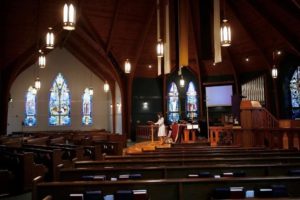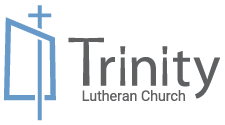Worship and piety in a time of pandemic, with faith in the one who said, “I go to prepare a place for you”
Beloved community,
Late last month, a couple of weeks after Easter Sunday, William B. Lawrence reflected on the question of gathering for worship during this time of pandemic. Professor Emeritus of American Church History at the Perkins School of Theology at Southern Methodist University, Lawrence was prompted by several congregations across the south that had publicly announced and hosted Easter services, despite recommended “stay at home” directives. Some in ‘prophetic protest,’ others arguing the the exercise of their constitutional rights, they gathered, but Lawrence questioned their motivations. Was their action threatening to make the public health crisis worse, endangering their communities, and risking the welfare of their adherents?
The freedom of religion and of public assembly are protected by state and federal constitutional provisions, and those freedoms are cherished liberties in our nation’s historical narrative. We know that the mission of the church differs from the mission of the state, and the mission of the church is not regulated in the same way as the government. In the words of Pastor John Greiner of Glorious Way Church in Houston, “We can’t do what God called us to do on live-stream.”
 However, many of us in the faith community have determined that churches cannot and must not do anything that puts human lives in danger, and we have exercised a different freedom, the freedom to abstain, for a time, from the gathering of community. Pastor Greiner’s observation has a kernel of truth – the ministry of the church is most certainly curtailed in this time of our separation. It is changed, and live streaming of worship in and of itself does not seem adequate. We counter his argument by saying that we are extending a new and creative love for one another by staying away from one another. Our ‘sheltering in place’ is offered as a sacrificial act that is not our preference; it is not how we prefer to live into our calling as a missional community. But we know that, by the grace of God, we will be together again.
However, many of us in the faith community have determined that churches cannot and must not do anything that puts human lives in danger, and we have exercised a different freedom, the freedom to abstain, for a time, from the gathering of community. Pastor Greiner’s observation has a kernel of truth – the ministry of the church is most certainly curtailed in this time of our separation. It is changed, and live streaming of worship in and of itself does not seem adequate. We counter his argument by saying that we are extending a new and creative love for one another by staying away from one another. Our ‘sheltering in place’ is offered as a sacrificial act that is not our preference; it is not how we prefer to live into our calling as a missional community. But we know that, by the grace of God, we will be together again.
So, throughout our nation and world, faith communities came to their significant springtime observances remotely. To promote a just society and care for the welfare of our sisters and brothers, we have embraced the position that the best way for religious communities to help slow the deadly COVID-19 pandemic is to suspend in-person worship services and gatherings that could spread the disease. Small groups of Christian worship leaders have been leading worship remotely to empty sanctuaries across the land. Muslims had already eliminated gatherings for daily and Friday prayers, and they began Ramadan on April 23 without the gatherings to feast together with family and friends at the end of daily fasting. Instead, Lawrence noted, they gathered “at sunset to share a quiet meal and end the fast as they shared it all day, isolated in their homes.”
 Passover Seders were likewise only shared virtually with extended families, if they were shared at all. Some, isolated at home, received Seder kits that were prepared and delivered for this year’s unusual observance. Jewish families found a moment of lighthearted celebration in naming their Zoom Seders “Zeders,” but still celebrated only in the isolation of their homes. An important moment in the Seder recounting of the Passover story comes with the youngest child asking, “Why is this night different from all other nights?” This year’s Passover Seder was most certainly different, but it still concluded with the hopeful cry, “Next year in Jerusalem!” For all our faith traditions, we hope that by the time of Easter, Ramadan and Passover in 2021, we will be back to some sort of new normal, some sort of New Jerusalem, gathering in the goodness of the community of faith together in festival observance. For now, we wait.
Passover Seders were likewise only shared virtually with extended families, if they were shared at all. Some, isolated at home, received Seder kits that were prepared and delivered for this year’s unusual observance. Jewish families found a moment of lighthearted celebration in naming their Zoom Seders “Zeders,” but still celebrated only in the isolation of their homes. An important moment in the Seder recounting of the Passover story comes with the youngest child asking, “Why is this night different from all other nights?” This year’s Passover Seder was most certainly different, but it still concluded with the hopeful cry, “Next year in Jerusalem!” For all our faith traditions, we hope that by the time of Easter, Ramadan and Passover in 2021, we will be back to some sort of new normal, some sort of New Jerusalem, gathering in the goodness of the community of faith together in festival observance. For now, we wait.
Yesterday’s Gospel included the well-known teaching of Jesus to his closest disciples, that he was going ahead of them to prepare a place for them. Throughout history, people of faith have ventured forth into the unknown with the hope that a place was being prepared for them. In recent years, around the world and in the midst of despair, people have fled from war, oppressive governments and disease, drowning in the sea, massing at borders, scaling walls, weeping at fences, hanging off of trains and traversing every landscape imaginable with a hope for home at the last, a place prepared for them. Jesus promised his disciples the most remarkable thing. “I go to prepare a place for you,” he said. (John 14:2) In their confusion they asked, ”Where? How? We don’t understand – show us!” And he answered them by telling them that he is both the destination and the path. There is a refuge, a place prepared, in his love. That message rings true to us 21st century disciples, even in a time such as this. The home of peace and safety that we all long for is found in Jesus, the way, the truth and the life. He is with us all along the roads, the streets and the byways, in places unseen and unknown. He is with us in our distancing, our separation, and our ‘sheltering in place.’ Jesus is Emanuel, God with us, and he goes before us to prepare the place. He shows us the way and he is the way.
The Hebrew word for Sabbath, Shabbat, is drawn from the word remembering God’s gift on the seventh day of creation. We often hear the translation of Shabbat as “rest,” that God rested on the seventh day. A better translation is “abstain.” God abstained from God’s creative work on the seventh day and taught us to do likewise, remembering the Sabbath day and keeping it holy. He taught us to abstain, to step away, as we make Sabbath. To some degree, this time of our abstaining from being together is a Sabbath time, a sabbatical. As we abstain from our gathering “in person,” let us make of this time a Sabbath of prayer, creative community and the nurturing of faith. We will be back to work together again. For now, we abstain. For now, we wait.
More on Sabbath keeping in another writing. For now, a blessed Eastertime friends.
Grace and peace,
Pastor Bob Linstrom
Photo credits
- Rev. Kristen Hanna in front of an empty sanctuary on March 15, the first Sunday of closure, Christ United Methodist Church in Chapel Hill, North Carolina
- Santa Fe’s Jewish Center Chabad providing free Seder kits
Reflection inspired by William B. Lawrence’s article “Pandemic Piety,” April 30, 2020 in Sightings; Reflections on Religion in Public Life, from the University of Chicago Divinity School


